

In August The English Apple Man escorted a group of German fruit growers in the West Midlands and visited two growers who are trying to avoid the world of 'volume production'
Stephen Ware is a Nuffield Scholar, farms at Throne Farm Weobley near Hereford and Matt Foster and his wife Gritt farm at Dingle Farm at Little Witley in Worcestershire.
Weobley.........
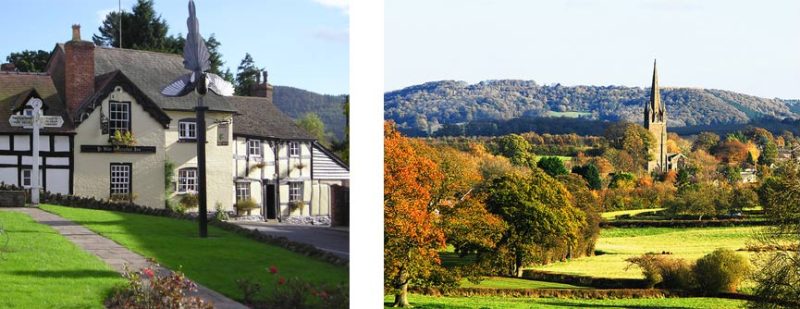
In the early 1600's one of Stephen Ware's ancestors - Viscount Scudamore introduced 'bitter sweet' apples to Herefordshire from France. In 1943 Stephen's Grandfather James Ware bought the farm.....
Leading the group of 31 German growers; Manuela Schielin............
Below: Manuela and Stephen pose in front of the Throne Farm History ........
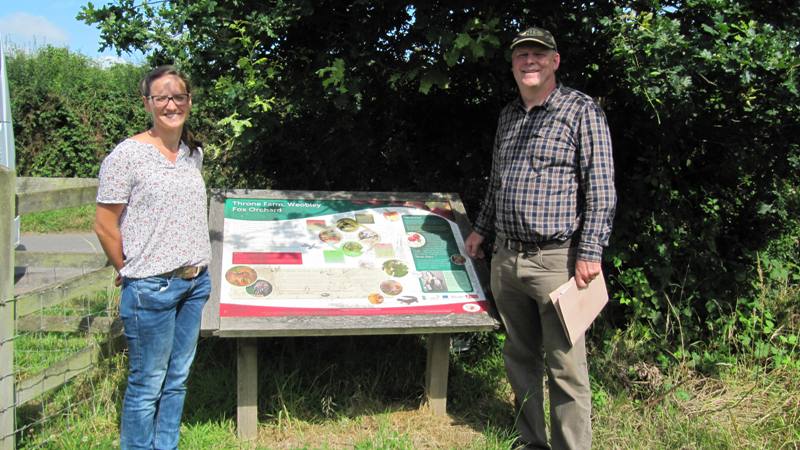
The history behind the farm name resulted from a visit by King Charles 1st on 5th September 1645 who enjoyed Cider during his stay at the farmhouse; hence the name: Throne Farm.....
The English Apple Man met Stephen Ware when, as a Nuffield Scholar when he presented his 'scholarship travels' to The Brenchley and East Sussex Fruit Group members in November 2013. It is well worth reading the Journal for 29th November 2013 as a 'lead in' to the German Growers visit to Throne Farm.
Throne Farm 'growing philosophy' - below an extract from the 'highly informative' Throne Farm website
"As the third generation of the Ware family to run Throne farm, it's important to reflect upon the input since 1943 from the rest of the family, headed by grandfather James and my father Mike.
If my wife Mandy and I are to achieve a sustainable business for our employees, daughter Lauren and future generations, it's our responsibility to merge these historical virtues within a modernising world.
Below: Stephen's attention to improving soil quality is the foundation for the Throne Farm business.....
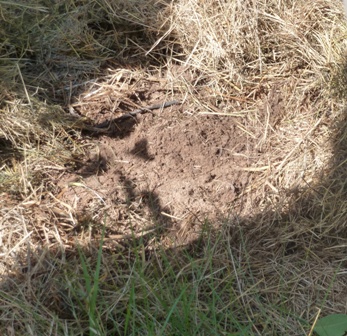 We start by preserving the soil and surrounding environment as a foundation to growing healthy nutrient dense fruit for the future health and wellbeing of our customers. If our efforts are valued then we can expect sufficient support to achieve our principles and aims and retain a healthy business.
We start by preserving the soil and surrounding environment as a foundation to growing healthy nutrient dense fruit for the future health and wellbeing of our customers. If our efforts are valued then we can expect sufficient support to achieve our principles and aims and retain a healthy business.
We are constantly striving towards sustainable conservation, resulting in healthy and tasty produce for future generations.
"As a practical farmer I won't rely upon some snake oil salesman to tell me what works, I need to see it for myself. This is why we have devised NUTRITION & HEALTH FARMING CHARTER. I want you to see the great lengths we go to in order to naturally maximise the nutrient density of the crops that we grow. Despite many positive virtues, modern organic farming can become a marketing paradigm about what is excluded from the process. The Nutrient Dense foods charter demonstrates that biological farming is all about what is included. I am certain that when you buy Throne Farm produce, this is reflected in the taste, quality and healthiness of our fruit.
Let your food be your medicine and your medicine be your food..........
Below: left; The Church Spire is a backdrop for the new orchards at Throne Farm and right; compost heap?
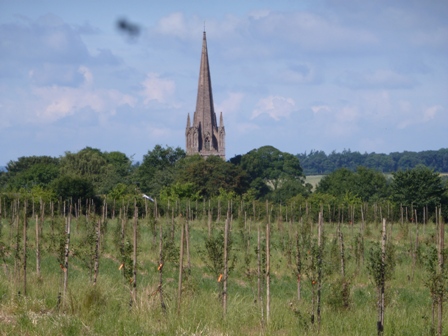
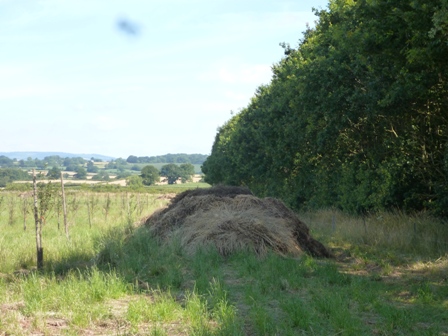
Below: left; 'Its all about soil structure and right; new trees
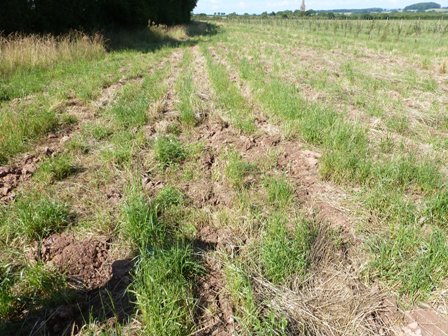
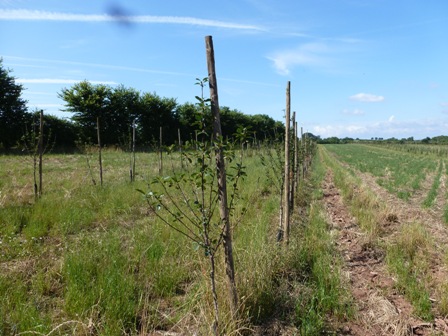
For more information: click on Throne Farm
Foswill Partnership Ltd
Matt and Gritt Foster are farming at Dingle farm in Little Witley in Worcestershire in a 'share farming' venture with the landowners, Richard & Penny Colwill.
Matt and Gritt are building their business on high quality - 'high value' - 'point if difference fruits' - during the visit the German Growers heard how the Foster's are growing exciting new varieties of Cherries, Apricots and Greengages.......they aim to avoid the vagaries of volume marketing......targeting specialist outlets....
Matt & Gritt have traveled extensively in the search for new varieties and management techniques: Matt in his welcome to the German Fruit growers 'smiled' at the irony of showing the gowers from Lake Constance around Dingle farm, as he has learnt so much from his visits to Germany. Matt also acts as Representative for VOEN the supplier of protective crop covering systems.
Below: VOEN tunnels at Dingle Farm
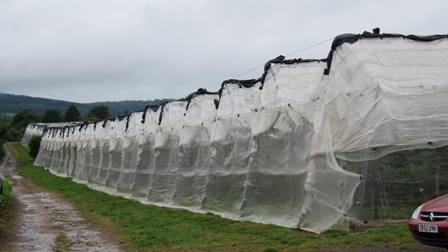
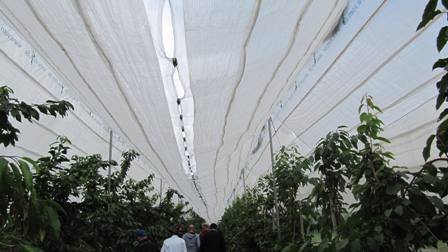
At the forefront of their production is the Rainier Cherry; with its very high sugars, Rainier is much sought after and Matt & Gritt have successfully exported to Paris, Barcelona and Dubai.
Rainier was developed in 1952 at Washington State University by Harold Fogle, and named after Mount Rainier. It is a cross between the 'Bing' and 'Van' cultivars.
'Rainiers' are considered a premium type of cherry. They are sweet with a thin skin and thick creamy-yellow flesh. The cherries are very sensitive to temperature, wind, and rain.
Growing the right yield and quality for 'the' quality market (high price) demands acute attention to detail: crop load is critical, it is
important not to overcrop the tree; the system must be carefully managed, pamper, utilise micro nutrients. Matt believes growing on the UFO system (Upright Facing Offshoots) and grown to 4.5 metres it reaches its potential - at that height the tree 'balances out' - below that and Matt feels it will not reach its full potential...answering my question on yield, Matt believes around 10 kg per tree; any more and the tree can't cope...
Below: left; UFO fruiting units and right; the fruiting units on the UFO system....
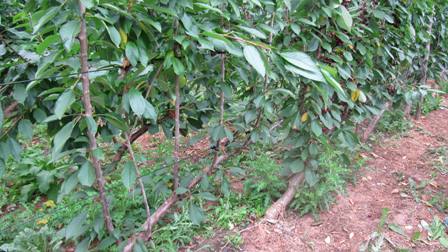
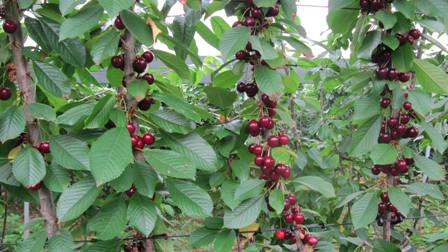
Apart from Rainier, Matt is growing the usual mix of Kordia, Regina, Sweetheart et al and among his trial varieties, three promising early cherry varieties emanating from Germany.
Moving onto the Apricots: Matt and Gritt have planted a selection of modern varieties and are growing them on a 'super-spindle' format. Gritt takes responsibility for the Apricot enterprise and emphasises the importance of light; Gritt is trialing pruning keeping the tree narrow. Matt & Gritt travel a lot and some of the techniques they are using are not new - already 'best practice' in Lake Constance. The chosen rootstock is WaVit with tree height 3.5-4m and alleyways at 4 metres. WaVit is Semi Vigorous. A robust disease resistant medium vigour, free standing and non suckering rootstock for plum, gage and damson, mirabelles and apricots proven to suit a wide range of soils and conditions.
Below: The young Apricot trees at Dingle Farm
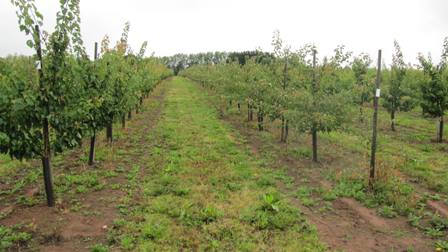
Wavit
The Wavit rootstock is a seedling of a European plum variety called Wangenheim. Unlike most other plum rootstocks it is therefore a true European plum (Prunus domestica) and hence has excellent compatibility as a plum rootstock, whilst also being useful for apricots.
It produces a free-standing semi-vigorous tree, roughly similar to St. Julien or a bit smaller, but of similar productivity and with good fruit size.
It is slightly more precocious than St. Julien - cropping may start in the third year. Another characteristic which is popular with commercial growers is that fruit ripens a few days earlier than the same variety on St. Julien.
It is suitable for a wide-range of soil conditions, with some tolerance of chalky soils.
Credit: Orange Pippin
Gritt is targeting an optimum size for the Apricots of 45mm - 60mm for 'niche' British Apricots.
Six new apricots have been planted and will be covered from 1st flower to the end of the 'tree ripened' season.
Greengages
The greengages are a group of cultivars of the common European plum. The first true greengage was bred in Moissac, France, from a green-fruited wild plum ('Canerik') originally found in Asia Minor; that original greengage cultivar nowadays survives in an almost unchanged form as the cultivar 'Reine Claude Verte'.
The third 'speciality' is Greengages - Reine Claude Verte, Reine-Claude de Bavay and Reine-Claude Doree.........
The fruiting season at Dingle Farm runs from June through to mid September with Cherries, Apricots and Greengages...
That is all for this week....after the recent family 'health' events we are getting closer to some sort of normality.......
Take care
The English Apple Man